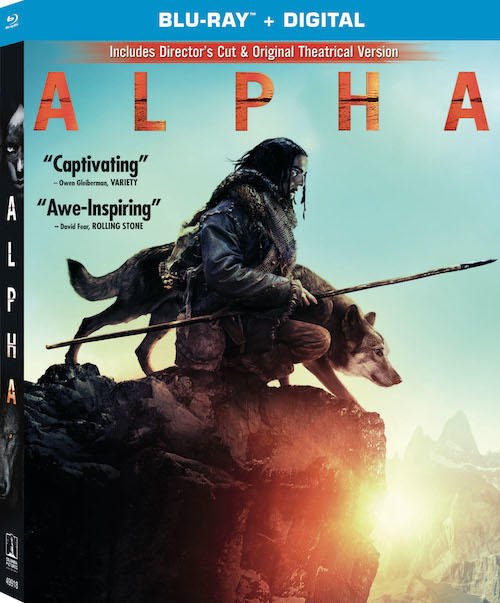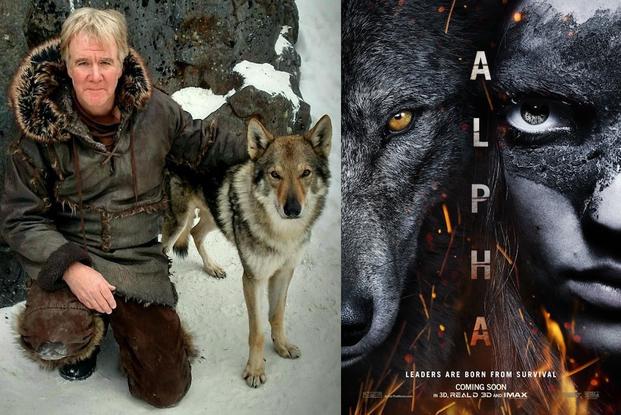"Alpha" (out now on Blu-ray, DVD and Digital) is a total surprise: a family-friendly, truly exciting movie with dogs playing wolves. Director Albert Hughes, working solo without his longtime partner and brother Allen ("The Book of Eli," "Dead Presidents"), moves away from the gritty urban drama he's known for and makes a spectacular Ice Age movie set in desolate and beautiful environments.
The human characters in the movie speak an unrecognizable ancient (and imaginary) language but you could easily follow the entire story if you chose to watch with the subtitles turned off. Young Keda (Kodi Smit-McPhee) is separated from his tribe during a hunt and finds a way to survive when he encounters an injured wolf separated from his own pack. The boy and wolf build a bond as Keda tries to find his people again.
Mark Forbes is an experienced animal trainer with credits on dozens on movies. He plays an important role on "Alpha" because the dog's performances as wolves are critical to the success of the story. Mark took time to speak with us about the movie and share some intel about his career.
You've worked with animals on a lot of movies, but "Alpha" seems different from anything you've ever worked on.
The thing that attracted me to this film is the story within the story, that you don't really even realize is maybe the story until the end of the movie, which is the beginnings wolves being domesticated into human civilization. When I was reading the script, I had no idea what the movie was about until the last page.
Obviously, the biggest challenge was the relationship that a wolf needed to have with an actor through the last three-fourths of the movie. We went through quite a few different ideas: Are we going use a real wolf? Are we going to use a dog that looks like a wolf? We looked at hybrids all over North America. Most of your hybrids here in North America tend to be husky/wolf or malamute/wolf crosses.
Our director, Albert Hughes, lives in Prague in the Czech Republic. He told me about the Czech Wolf Dog breed, which was an experiment of the Czechoslovakian military in the 1950's. They wanted a dog, a military dog, and they thought breeding wolves with German Shepherds would give them a military dog. I don't think it worked out for them so much.
But the breed actually caught on in Europe. Now it's a recognized breed in Europe. There's not a lot of them, but there are some. The people who do have them, if they show the dog, they put them in the car, they drive them to the show, they get socialized. It was just a whole different animal than the hybrid that you usually see in North America that just lives in someone's backyard.
The Czechoslovakian Wolf Dog just gave us so many more options as far as working with an actor. He still has wolf tendencies, but much more easy to work with than a full wolf would have been.
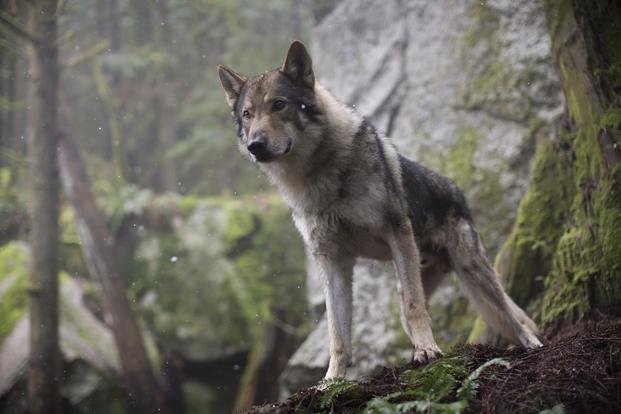
I would have never guessed the breed is part German Shepherd. The dog looks like a wolf in the film.
He is definitely very much wolf-y looking even for a Czechoslovakian Wolf Dog. Having looked at so many different types of hybrids, I find that the German Shepherd Wolf cross looks much more wolf-y than especially the malamute, but even the husky, in that the body type is definitely more wolf-looking than some of your North American hybrid looks are.
The thing that gives him away is the face, the eyes, really. The wolf eyes are very crescent moon-shaped. They have a bigger ruff on their neck and a little bit longer muzzle. And I think they gave us a little bit of CGI help on Chuck, especially early in the movie, where he's supposed to be more ferocious and more antagonistic towards Kodi's character. As the film progressed, they did a little bit less and less of that as the wolf's character softened towards him. His look softens as well, so by the end of the movie you see the real Chuck, as it were.
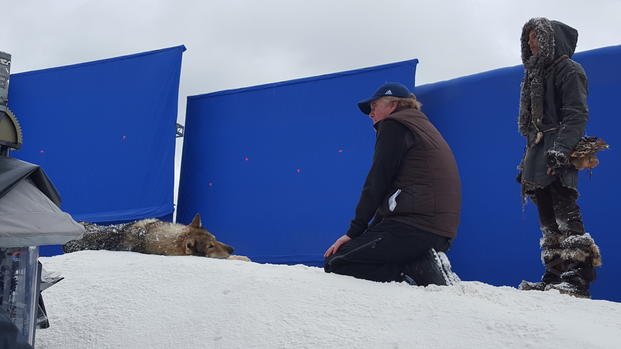
You're working with a domesticated animal, but it looks like the filming was not under the easiest of conditions. Maybe some of the environment is CGI, but a lot of it looks like it's shot out in tough conditions out in the wild.
It was both. We shot in a parking lot in front of blue screen for some of these scenes and then we went to Alberta and shot in some of the rough terrain that you see. To be honest with you, for Chuck and the wolf dogs that we worked with, it was easier for us to work out in those conditions than it was on a stage. They liked being outside, they liked the openness, they liked being able to see for miles. When they're confined on a stage, they're much more wary and looking at everything around them. The sounds reverberate and everything is right on top of them, as opposed to being out in the open. Although the locations were very hard for the rest of the crew, they actually made things a little bit easier for us. It also made it easier for Chuck to portray that character out in those locations. He definitely looks more wolf-like out on top of a cliff than in the back-parking lot in front of a blue screen.
There are a lot of wolves in the movie. How many of those are CGI and how many are dogs?
We had six other Czechoslovakian Wolf Dogs that we use as sort of the pack that Chuck belonged to and then went back to for a short time in the film. We actually did have a pack that all got trained and learned to hit their marks and work together. It was definitely a group effort.
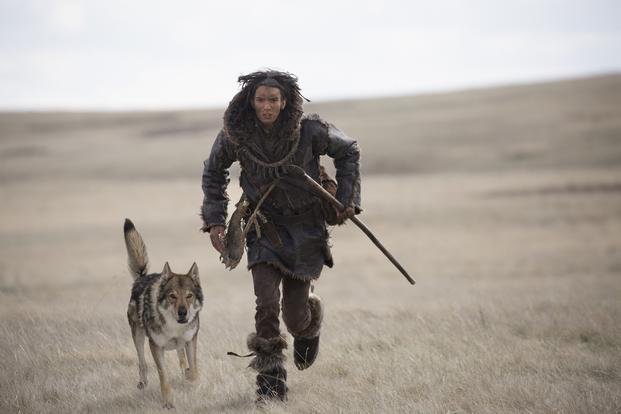
I recently read Jack London's "White Fang" and the movie really brought to mind that story, even though the book is 100 percent a story told from the wolf's perspective. It's a great story about how wolves were domesticated and became dogs. Why do you think wolves and humans developed this bond?
Wolves are such a pack animal. They want to belong to a pack, they thrive in a pack. They're an apex predator not because any single one of them is the apex predator; it's the pack that is an apex predator. Working together, they can hunt almost anything. Same with the African wild dogs in Africa; it's the group working together that makes them so efficient and lethal. There's a pact between the animals; but it's not a solitary creature that just kills to get dinner. They really have to figure out how to work together to eat. It's all about the group.
There are other pack animals, but there's something about the wolf that easily assimilates into our human world. Having worked with many different animals, there's no other animal that wants our approval just as much as the treat during training. For a lot of other animals, it's just about the treat.
With the dog, that pat on the head becomes almost just as important as the treat does. And it goes back to that pack where dogs decide that they're doing this together, they all get along or they fight and they figure out where their place is in the pack. But it's about the pack, it's about, eventually, all of them getting along and working and living together, which is obviously also very much a human condition. There's just something about wolves and dogs that really seems to lend itself towards this kind of the human lifestyle.
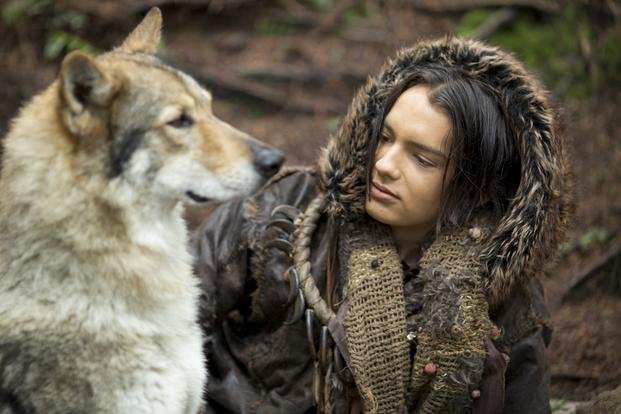
Obviously, there are a lot of people who serve in the military who are involved with military dogs and training. If someone is getting out of the service and they're interested in getting your job, do you have insight about how to do that?
Sure. I kind of fell into it. I attended an exotic animal training and management program at Moorpark College, a little community college outside of Los Angeles. I graduated high school, I went to a year at Southern Oregon State and didn't know what I wanted to do with my life. I heard about that program and had always wanted to do something with animals as my career, but didn't know what exactly. So I applied to that program and I got accepted.
It was really broad-based. It was everything from zookeeping to pre-vet to working with marine mammals, kind of the whole gamut. It was a two-year program that didn't specialize in any one thing, it just hit on everything.
As I was graduating, I saw a little notice on the bulletin board from a trainer named Ray Berwick. We had read his training book in one of our classes and he was the old Hollywood trainer who had done Alfred Hitchcock's "The Birds" and a bird on a TV show called "Baretta." Ray was putting together a dog show at Knott's Berry Farm. I applied and got accepted. I didn't do that very long. I very quickly started doing the dolphin and sea lion show. That led to doing the Animal Actors live show at Universal Studios. From there, I just sort of fell into doing what I do today, which is working with animals in movies and television.
All that is to say that I sort of just fell into this job. I do love it. Whether you go volunteer with a trainer or a company that does this or go to school at Moorpark, just find a way to get a foot in the door and then make the most of it. I think that's what everybody in this industry has done at one point or another.
You have to find out if you really love it or not because, as an old movie trainer told me, there are two days of glamour in this business: The day you get the job and the day the movie comes out. All the rest is just really hard work.
You really have to love what you do There are no days off, you take care of animals all the time, you pick up a lot of poop, but you get to spend your day working with animals. Which, if you love it, that's definitely the reward in itself.
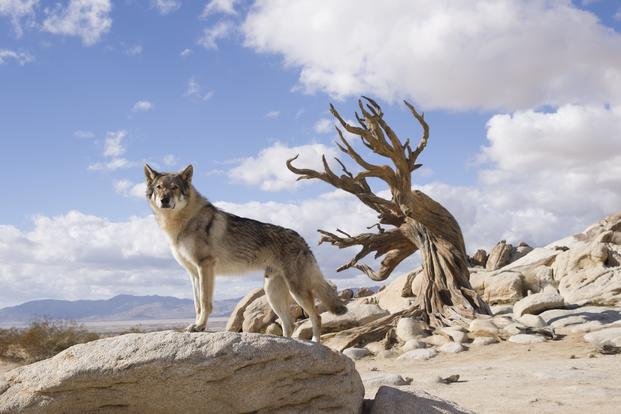
Is your business all based in California or are there opportunities for animal trainers in other places where they're making movies and tv these days?
There are. I would say the biggest sort of center outside of Los Angeles now is Atlanta. I'm in Savannah, Georgia, right now, working on a project. So in Georgia, definitely the Atlanta area, there's huge film production. Vancouver is another big one. England right now is hopping. They have a very large tax incentive and a lot of stuff that shoots in Europe now originates in London and in England.
New Mexico shoots quite a bit. There's New York, there's Michigan, there's Louisiana. They have incentives and there are quite a few crews in those areas as well. But the big ones are Los Angeles, Atlanta, Vancouver, London. And then to a little bit lesser extent, New Mexico. There are animal companies in each of those locations, so you certainly don't have to be based in Los Angeles.
Thanks for talking to us about "Alpha." It's really a surprising movie.
Yeah, it's surprising it even got made. It was such a sort of pure idea and it was all Albert, it was the director. He pushed for it and he fought to keep it from being watered down. I applaud the effort, because you just don't see movies like this that often.
